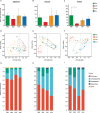A multi-omic assessment of the mechanisms of intestinal microbes used to treat diarrhea in early-weaned lambs
- PMID: 38193712
- PMCID: PMC10878098
- DOI: 10.1128/msystems.00953-23
A multi-omic assessment of the mechanisms of intestinal microbes used to treat diarrhea in early-weaned lambs
Abstract
Transplant of donor microbiota can significantly alter the structure of the host's intestinal microbiota and alleviate early weaning stress. Screening for alternative-resistant products by transplanting fecal bacteria from healthy lambs is a current research trend in the livestock industry. In the present study, fecal microbiota transplantation was performed in lambs with diarrhea during early weaning. The transplanted fecal microbiota greatly reduced the diarrhea and serum inflammatory factor levels caused by early weaning. Transcriptome sequencing revealed that fecal microbiota transplantation alleviated colonic inflammation and increased the expression of colonic ion transport proteins. In addition, the levels of Streptococcus, Enterococcus, and Escherichia Shigella decreased in the jejunum, cecum, and colon of the lambs; meanwhile, the levels of Bifidobacterium and multiple secondary bile acids, such as ursodeoxycholic acid, increased in the colon. Furthermore, the abundance of Bifidobacterium was significantly negatively correlated with the diarrhea index. The fecal microbiota transplantation reshaped the intestinal microbiota of early-weaned lambs, protected the intestinal physiology and immune barrier, and reduced weaning stress. In addition to making available bacteriological products for controlling intestinal inflammation in young lambs, this study offers a theoretical framework and technical system for the mechanisms by which microbiota transplantation regulates intestinal health in young lambs.IMPORTANCEBefore weaning, the digestive system of lambs is not well developed; hence, its resistance to infectious diseases is weak. Under intensive feeding systems, lambs can easily be stressed and the risk of bacterial infection is high, which causes diarrhea, which in turn may cause mortality and significant economic losses to the livestock industry. With the elimination of antibiotics in animal feed, the incidence of mortality due to intestinal illnesses in lambs has gradually increased. There are several types of probiotics routinely used in young animals, but the effects and processes of their usage have only been assessed in monogastric animals. The lack of data on ruminants, particularly sheep, has severely hampered the process of efficient and healthy sheep breeding. Therefore, there is an urgent need to identify effective and safe functional supplements for lambs.
Keywords: diarrhea; early-weaning stress; fecal microbiota transplantation; lambs.
Conflict of interest statement
The authors declare no conflict of interest.
Figures





Similar articles
-
Bifidobacterium animalis Promotes the Growth of Weaning Piglets by Improving Intestinal Development, Enhancing Antioxidant Capacity, and Modulating Gut Microbiota.Appl Environ Microbiol. 2022 Nov 22;88(22):e0129622. doi: 10.1128/aem.01296-22. Epub 2022 Oct 27. Appl Environ Microbiol. 2022. PMID: 36300953 Free PMC article.
-
Dietary medium-chain fatty acid and Bacillus in combination alleviate weaning stress of piglets by regulating intestinal microbiota and barrier function.J Anim Sci. 2023 Jan 3;101:skac414. doi: 10.1093/jas/skac414. J Anim Sci. 2023. PMID: 36562268 Free PMC article.
-
Early-Life Intervention Using Exogenous Fecal Microbiota Alleviates Gut Injury and Reduce Inflammation Caused by Weaning Stress in Piglets.Front Microbiol. 2021 Jun 10;12:671683. doi: 10.3389/fmicb.2021.671683. eCollection 2021. Front Microbiol. 2021. PMID: 34177852 Free PMC article.
-
Modulating gastrointestinal microbiota to alleviate diarrhea in calves.Front Microbiol. 2023 Jun 8;14:1181545. doi: 10.3389/fmicb.2023.1181545. eCollection 2023. Front Microbiol. 2023. PMID: 37362944 Free PMC article. Review.
-
Enterotoxigenic Escherichia coli infection of weaned pigs: Intestinal challenges and nutritional intervention to enhance disease resistance.Front Immunol. 2022 Aug 5;13:885253. doi: 10.3389/fimmu.2022.885253. eCollection 2022. Front Immunol. 2022. PMID: 35990617 Free PMC article. Review.
Cited by
-
Gut Microbiota of Ruminants and Monogastric Livestock: An Overview.Animals (Basel). 2025 Mar 6;15(5):758. doi: 10.3390/ani15050758. Animals (Basel). 2025. PMID: 40076043 Free PMC article. Review.
-
Effects of grape seed extract supplementation on the growth performance, nutrients digestion and immunity of weaned lambs.Front Vet Sci. 2024 Sep 13;11:1402637. doi: 10.3389/fvets.2024.1402637. eCollection 2024. Front Vet Sci. 2024. PMID: 39346956 Free PMC article.
-
The expression pattern of butyric acid transporter in the large intestine with growth and development of suckling lambs.Anim Biosci. 2025 May;38(5):968-980. doi: 10.5713/ab.24.0490. Epub 2025 Jan 24. Anim Biosci. 2025. PMID: 39901713 Free PMC article.
-
Longitudinal dynamics of plasma bile acids and their associations with physiological parameters and fecal microbiome during the transition period in dairy cows.Anim Biosci. 2025 Jun;38(6):1194-1205. doi: 10.5713/ab.24.0628. Epub 2025 Feb 27. Anim Biosci. 2025. PMID: 40045625 Free PMC article.
-
Early Weaning Impairs the Growth Performance of Hu Lambs Through Damaging Intestinal Morphology and Disrupting Serum Metabolite Homeostasis.Animals (Basel). 2025 Jan 6;15(1):113. doi: 10.3390/ani15010113. Animals (Basel). 2025. PMID: 39795056 Free PMC article.
References
-
- Zhang K, Xu Y, Yang Y, Guo M, Zhang T, Zong B, Huang S, Suo L, Ma B, Wang X, Wu Y, Brugger D, Chen Y. 2022. Gut microbiota-derived metabolites contribute negatively to hindgut barrier function development at the early weaning goat model. Anim Nutr 10:111–123. doi:10.1016/j.aninu.2022.04.004 - DOI - PMC - PubMed
-
- Dubinsky V, Reshef L, Bar N, Keizer D, Golan N, Rabinowitz K, Godny L, Yadgar K, Zonensain K, Tulchinsky H, Gophna U, Dotan I. 2020. Predominantly antibiotic-resistant intestinal microbiome persists in patients with pouchitis who respond to antibiotic therapy. Gastroenterology 158:610–624. doi:10.1053/j.gastro.2019.10.001 - DOI - PubMed
-
- Hu J, Ma L, Nie Y, Chen J, Zheng W, Wang X, Xie C, Zheng Z, Wang Z, Yang T, Shi M, Chen L, Hou Q, Niu Y, Xu X, Zhu Y, Zhang Y, Wei H, Yan X. 2018. A microbiota-derived bacteriocin targets the host to confer diarrhea resistance in early-weaned piglets. Cell Host Microbe 24:817–832. doi:10.1016/j.chom.2018.11.006 - DOI - PubMed
MeSH terms
Grants and funding
LinkOut - more resources
Full Text Sources
Medical

